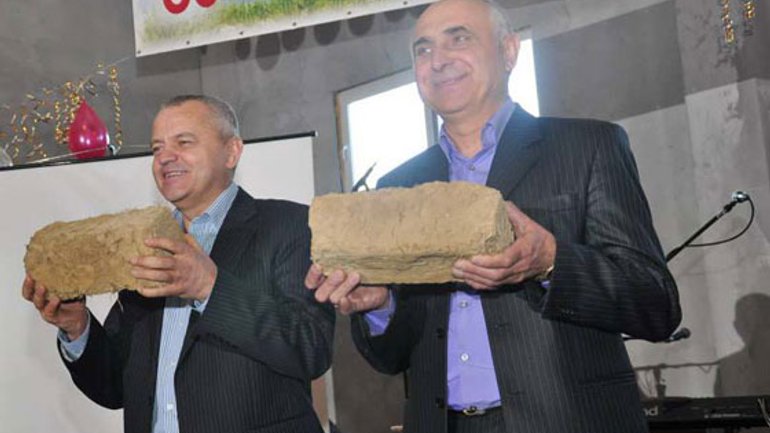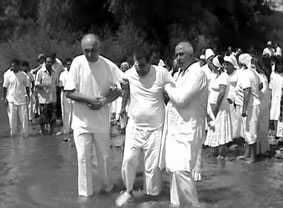Transcarpathian Romani People: 30 years with God

On April 8 the International Romani Day is marked all over the world. The Romani from Transcarpathian regions have recently celebrated the anniversary of their Christian community.
The pastors who stood at the origins of the Romani Christianity in Mukachevo are Serhiy Balyuk and Mykhailo Balko.
Last December, there was a celebration in the Romani camp in Transcarpathian Mukachevo: the Romani celebrated the 30th anniversary of the time when as they said, they heard the Good News of Jesus the Savior. That winter, a Church was instituted in the camp.
At the end of 1984 a young Christian from Chervonohrad Serhiy Balyuk by God’s call came to preach the Gospel in a gypsy camp in Mukachevo. The evening meetings in close hut, crammed with Roma, the Word of God proclaimed in the light of soot, persecution by the Soviet government and the Romani hiding their young pastor – all that gave their fruit. Christian awakening between the Romani began: whole families of them converted to God and started a new life. Years passed and the Romani learned to live in a new way, refusing from old habits and lifestyle, started learning to read and write, to give their children to school.
Today, coming to the camp, Serhiy Balyuk, now the Bishop of the United Christian Evangelical Church of the Living God, Pastor of the Church of Living God in Kyiv cannot hold back his tears when seeing among the audience the ones who were among the first Romani converts.
 “A new generation of people emerged,” he said. - People who are not steeped in sin. A Romani says: “By now, I could have been a drug addict, perhaps, sitting in jail, maybe I would have died. But since I accepted Jesus at the age of seven, I do not know what drugs and alcohol are. But I know who Jesus is.” It is a great blessing to see it! The Romani are very sensitive people,” says pastor Serhiy. “They listen to their heart and feel who loves them and who does not. The Romani are the people who do not have their state, neither do they have a president of their own. Their fate is somewhat similar to the fate of the Jewish people. And their president became Jesus Christ, and heavens became their state.” “Spirituality, family, education and self-governance - only four of these points may change this nation,” the pastor adds.
“A new generation of people emerged,” he said. - People who are not steeped in sin. A Romani says: “By now, I could have been a drug addict, perhaps, sitting in jail, maybe I would have died. But since I accepted Jesus at the age of seven, I do not know what drugs and alcohol are. But I know who Jesus is.” It is a great blessing to see it! The Romani are very sensitive people,” says pastor Serhiy. “They listen to their heart and feel who loves them and who does not. The Romani are the people who do not have their state, neither do they have a president of their own. Their fate is somewhat similar to the fate of the Jewish people. And their president became Jesus Christ, and heavens became their state.” “Spirituality, family, education and self-governance - only four of these points may change this nation,” the pastor adds.
Maria Horvat, a Romani, “veteran” of the Romani church, recalls her first meeting with the young pastor, saying: “I did not want him offended, I thought, what a young boy came in, what did he need? He asked whether he could hold a meeting there. “Ouch, I say, You may not, because if a husband learns he will kill you and me!”
Hashpar Horvat, Mary’s husband, the elder of Mukachevo camp, a veteran of the Romani church remembers the time: “I asked her a question: whom do you choose: me or your God? If you choose God, you will die. I took an axe in my hand and got her hair spooled around my hand so she could not escape. I raised an axe, and she said, “Do whatever you want, I won’t secede from God ... “I wanted to hit her, but someone grabbed my hand. I felt there is someone behind me ... It touched me ... “
Joseph Virah, one of the veterans of the Romani church: "I thought that we, Roma, are such a sort of people that have no God. We have absolutely no our God. No one likes us. And we always lived like castaway people, the filth of the world. I knew nothing about God, absolutely! And when I saw that white people (Ukrainian or Hungarians) go with black books in their hands, I felt so bad in my heart. I thought to myself, "Lord, you see, they have God, and we have nothing ...” But when I came to know that their God may become our God, too, I thought to myself: I won’t give this God to anyone! "
Maria Horvath about Pastor Serhiy: “It happened they hit him ... but he was sent to us from God, because he abased himself and descended where we were. We are a kind of people, you know, not good. We get offended soon, easily get angry, and have a ready tongue. But he stayed with us.”
Iosyp Virah: “We believed him because everything he said was true. He was ready to anything for us. Ready to give life for the Romani.”
Many Romani started to learn the alphabet with the Bible. An incident when a Romani asked Serhiy Balyuk for a Bible, and answering to the pastor’s question why he needed this book being unable to read, the Romani replied, “I will smell it ...”
Since 2010, Emmanuel Charity Association works in Transcarpathian camps under the Everyday Bread program just in order to help the Romani cope with their problems and bring them out of poverty that reigned for generations in their nation. Association holds a number of trainings and seminars for the Romani, teaching them basics of agriculture. Today, not believing in the success of their own efforts, the Romani independently keep houses, plant potatoes, cabbage, breed chickens, pigs and learn to breed fish.
At some time Serhiy Balyuk realized the need to gradually delegate the church service to Romani themselves, but one Romani, now deceased, vigorously objected: “I will not allow a dirty gypsy hand on my head!” That is, they did not recognize the authority of Romani. And it took 2-3 years to break this stereotype so that the Romani realized the need to accept leaders from among themselves.
Today Romani Christian community has its own prayer house in the camp in Mukachevo (which is one of the largest Romani camps in Ukraine) preaching the Gospel among the Romani area. At the time, young Christians Mukachevo Romani Church of the Living God lit the desire to bear the gospel to other camps and became missionaries. Senior pastor of Romani living God churches in Transcarpathian region Olexandr Horvat said that over past 30 years, since the Word of God began to be preached in Mukachevo camp, three generations of Romani Christians have grown who serve in various areas of life: work in Romani kindergartens, elementary schools, go as missionaries to other camps of the region. "Today, there are 20 Romani Churches of Living God in Transcarpathian region, camps have houses of worship, where there are soup kitchens and primary schools,” says Pastor Olexandr.
Today the camps where Christians live serve as an evidence of God’s might also for non-Romani coming as guests, because the camp where Christians live and the camp where they do not are very different from each other.
In Transcarpathian region there are 14 thousand Romani people according to the official census and over 30 thousand in fact, sociologists say. This is one third of all Romani in Ukraine. Stereotypes and ignorance prompt us that those people are only able to steal drain covers, cut metal spoons, beg in the cities, and play and dance well. That’s wrong, the Romani know much more.
In the mid-90's, at the time when an ordinary citizen mixed indiscriminately all non-Catholic and non-Orthodox and called it an evil word "sect", the missionaries came to Romani people. And they brought them Protestantism, imported by Transcarpathian workers in the 30-ies from America, where there was an “explosion of Protestantism” and the famous “Wake on Azusa Street” when all the bars and clubs closed in San Francisco, for all their regulars stayed in churches. In the 90-ies the Transcarpathian Romani also came to the church. The preachers, though white, drank with them from the same mugs and churned clay in one trough. They believed. In addition to faith in Christ the Savior, the white missionaries brought a habit to wash things and keep home clean, build restrooms, taught their children to read and fed the families that were in poverty. And houses of worship were built in camps. Over 20 years in our region the number of such “camp churches” grew up to 17. The 18th was opened in 2015 in Chop.
The answer to the question “why do the Romani need a separate church?” is very simple. Let's be honest with each other, Ukrainians, despite the declared tolerance, are not very happy to see them in traditional churches right beside themselves. Just as the Americans (also Christians, by the way) were not happy to have the black people around. This is the way the American Black Pentecostal Church (black Pentecostal churches) emerged. And we’ve got the Romani Church.









